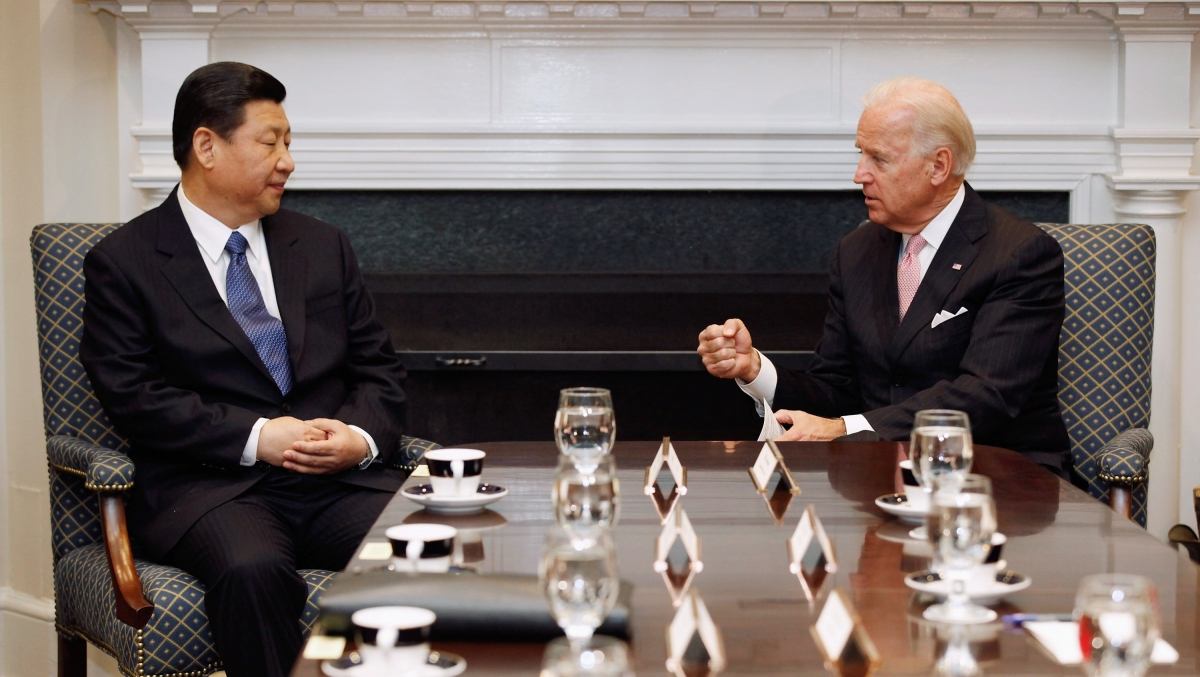ASPI Note: March 18 Biden-Xi Virtual Meeting

(Photo by Chip Somodevilla/Getty Images)
March 21st, 2022 by Daniel Russel | 22/15
What Happened?
The second virtual meeting between the U.S. and Chinese presidents on March 18 ran for two hours and focused heavily on the current Russia-Ukraine crisis.
- The official readout from the White House was terse; reinforcing Biden’s warning of serious consequences if China provided material aid to Vladimir Putin’s war effort. Subsequent briefings added more detail and color.
- U.S. President Joe Biden reviewed the extensive American efforts to prevent the invasion and outlined the measures now being taken, including in response to Russian disinformation about biological weapons in Ukraine as a pretext for a false-flag operation — warning the Chinese side against echoing Russian propaganda. He also underscored the unity and resolve of the United States, its allies, and international partners and described the implications of Russia’s action for the international order, as well as its potential impact on U.S.-China relations.
- Beijing’s lengthy readout selectively quoted Biden’s comments in the secure videoconference — a violation of diplomatic norms against one side making public what the other leader said. Not surprisingly, Beijing chose to reveal Biden’s reassurances to Xi on key aspects of U.S. policy toward China and Taiwan such as the “One China Policy.” The Chinese report described Xi Jinping’s criticism of the previous U.S. administration and his warning that now “some people” on the U.S. side were damaging bilateral relations by encouraging Taiwanese independence.
- Xi expressed willingness to provide humanitarian aid both to Ukraine “and to other countries” — although it is not clear if that might include Russia. He stated that China wanted to avoid civilian casualties or a humanitarian crisis and hoped talks would produce an early ceasefire — without indicating if China would use its influence with Russia to push for these goals.
- The readout forcefully emphasized Xi’s warning that imposing sanctions on China would trigger “a serious global crisis” and cause “irreparable losses” to the world economy, especially given the ongoing struggle to protect people’s livelihoods and to deal with the pandemic. China’s routine “principled opposition” to sanctions outside United Nations Security Council resolutions was not mentioned in the statement.
The Background:
- Negotiations over the agenda and timing had been underway for weeks — well before the invasion of Ukraine. National Security Advisor Jake Sullivan and Chinese Communist Party Politburo Member and Director of the Office of the Foreign Affairs Commission Yang Jiechi recently held marathon discussions in Rome to review the issues and finalize plans for the virtual leaders’ meeting.
- Xi’s plans in the run-up to the Party leadership conference this fall had already been disrupted by an Olympic diplomatic boycott, the most serious outbreak of COVID in China since the pandemic began, and the worst economic outlook in decades.
- The Russian invasion of Ukraine has now created a geopolitical crisis that is uniting the West, weakening Russia, and threatening China’s international reputation and standing.
- Chinese observers appeared shocked by Putin’s precipitous move to a full invasion the day after the Olympics, the unexpected incompetence of the Russian military, the resolve and effectiveness of Ukrainian resistance, and the solidarity and force of the international response led by Europe and the United States.
- The call took place as Beijing tries to juggle two contradictory needs: China wants Russia as a strategic partner against the United States; but it also needs U.S. and European trade, markets, and investment. The Chinese leader doesn’t want to see Putin taken down — but neither does he want China to pay a price for what Putin is doing.
Key Takeaways:
- The stark warning delivered directly by Biden that China would suffer heavy economic costs should it come to Putin’s aid represents a serious threat to Xi’s agenda in 2022.
- Nevertheless, Washington’s intense focus on Russia’s invasion of Ukraine diverts attention and resources away from Biden’s Indo-Pacific and anti-China strategy.
- Other than Xi’s predictably heavy focus on Taiwan during the call, the broader international agenda of trade, climate, North Korea, Iran, and nuclear security was largely preempted by the Ukraine issue. Prospects for progress on bilateral and global issues through direct leaders talks — not great to begin with — have been set back.
What to Watch:
- Beijing’s effort to straddle its conflicting interests has generated mixed messages — propagating Russian disinformation at home while claiming to be a peacemaker to international audiences. But China has made no effort to get Putin to stop attacks on civilians or accept a ceasefire, and Xi’s platitudes about dialogue and restraint in the call did not seem to impress Biden.
- By leaking reports that China was entertaining a Russian request for military equipment, American intelligence made plain that it is closely monitoring Beijing’s behavior and adherence to Western sanctions. And as Xi implicitly acknowledged to Biden, the consequences of punitive sanctions against China would exacerbate the country’s already substantial economic problems. And China’s economy, already faced with slowing growth, may be particularly vulnerable to surging energy and commodity prices.
- As they had done in their November call, the two leaders tasked their teams to continue discussions and “follow up in a timely manner.” But in the four months between the two leaders’ calls, their top officials held only two phone calls and one in-person meeting. A faster tempo of discussions would seem prudent in the current crisis.
